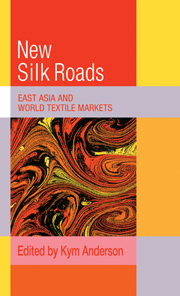Book contents
- Frontmatter
- Contents
- List of figures
- List of tables
- Contributors to this volume
- Preface
- Abbreviations and acronyms
- Symbols
- Introduction and summary
- I FIBRES, TEXTILES AND ECONOMIC DEVELOPMENT
- II DEMAND FOR TEXTILE EXPORTS FROM NEWLY INDUSTRIALIZING ASIA
- 5 The Multi-fibre Arrangement and China's growth prospects
- 6 International competition and Japan's domestic adjustments
- 7 The new silk road to Europe
- 8 The redirection of United States imports
- 9 Structural adjustments in Australia and New Zealand
- III CONCLUSIONS
- Appendix: Data on world production, consumption and trade in textiles, clothing and fibres
- Bibliography
- Index
8 - The redirection of United States imports
Published online by Cambridge University Press: 19 January 2010
- Frontmatter
- Contents
- List of figures
- List of tables
- Contributors to this volume
- Preface
- Abbreviations and acronyms
- Symbols
- Introduction and summary
- I FIBRES, TEXTILES AND ECONOMIC DEVELOPMENT
- II DEMAND FOR TEXTILE EXPORTS FROM NEWLY INDUSTRIALIZING ASIA
- 5 The Multi-fibre Arrangement and China's growth prospects
- 6 International competition and Japan's domestic adjustments
- 7 The new silk road to Europe
- 8 The redirection of United States imports
- 9 Structural adjustments in Australia and New Zealand
- III CONCLUSIONS
- Appendix: Data on world production, consumption and trade in textiles, clothing and fibres
- Bibliography
- Index
Summary
Since its establishment as a temporary trade measure on 1 January 1974 the MFA has gone through four refinements. The latest extension, referred to as MFA IV, became effective on 1 August 1986 and is scheduled to expire on 31 July 1991. This extension expanded the coverage of the MFA from textiles and clothing of cotton, wool and man-made fibres to include products of silk blends and of non-cotton vegetable fibres. As of 16 December 1988, MFA IV had been signed by 39 countries, including the US, and the EC as a single signatory.
During 1988 the United States had bilateral textile agreements with 43 countries and 2 US possessions. All but 15 per cent of the volume of US textile and clothing imports were from MFA signatories. Of the countries with which the United States had bilateral agreements, the leading suppliers were China, Taiwan, Korea and Hong Kong. Together these four accounted for 41 per cent of all US imports of textiles and clothing. In the same year the GATT reached the midpoint of the Uruguay Round, the eighth round of multilateral trade negotiations conducted since its inception. Much of the work related to trade in textiles in the GATT during 1988 focused on reviewing proposals to establish ‘techniques and modalities’ which would permit integrating the sector into the GATT. These discussions are expected to continue for some time with minimal results. This pessimistic conclusion is based on the recent record of the US in monitoring and controlling textile and clothing imports from all suppliers, and especially from its leading suppliers.
- Type
- Chapter
- Information
- The New Silk RoadsEast Asia and World Textile Markets, pp. 148 - 166Publisher: Cambridge University PressPrint publication year: 1992

